Report on Starbucks Tax Evasion and its Ethical Ramifications
VerifiedAdded on 2020/10/22
|9
|2681
|62
Report
AI Summary
This report provides an in-depth analysis of Starbucks' tax evasion scandal, focusing on the ethical implications and impact on various stakeholders. The report begins with an executive summary and an introduction to business ethics, followed by an analysis of the issue. The analysis section examines the impact of the tax evasion on shareholders, the board of directors, customers, and the company's revenue. The findings indicate a negative impact on all these elements due to the unethical practices. The report concludes with a summary of the findings and provides recommendations for Starbucks to adopt ethical and legal practices. The recommendations emphasize the importance of transparency with customers and adherence to regulations to restore the company's reputation and financial performance. The report highlights the importance of ethical conduct in business operations and its impact on a company's overall success and sustainability.
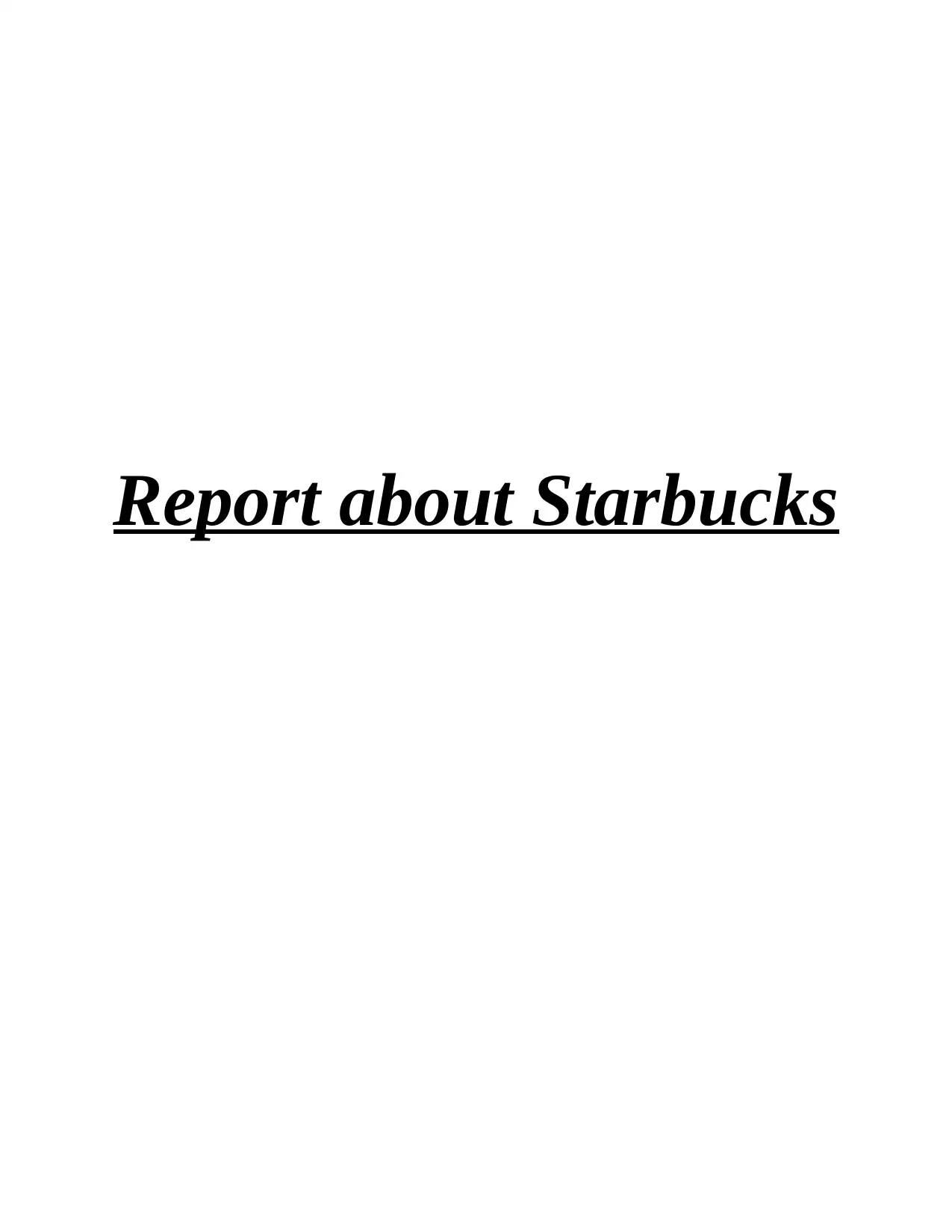
Report about Starbucks
Paraphrase This Document
Need a fresh take? Get an instant paraphrase of this document with our AI Paraphraser
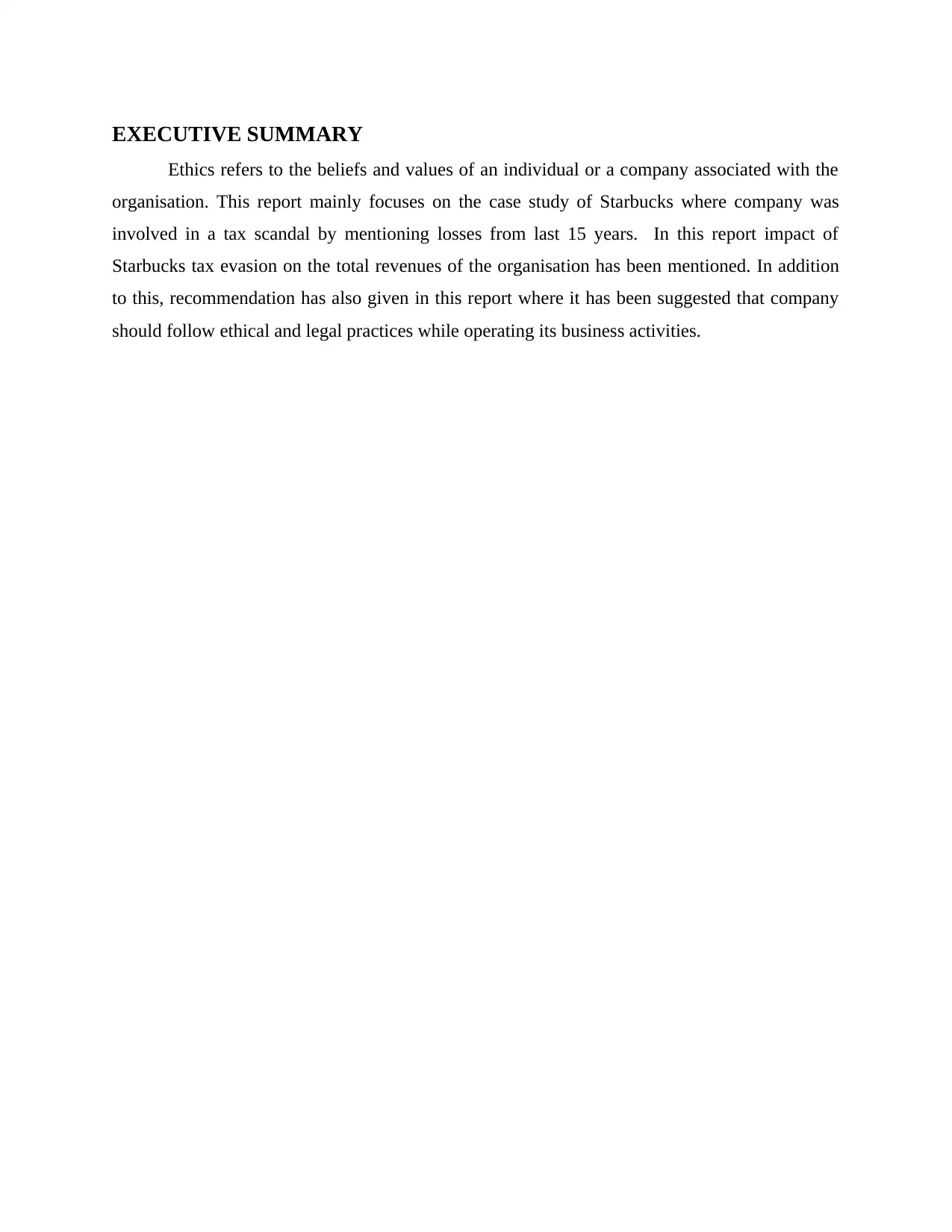
EXECUTIVE SUMMARY
Ethics refers to the beliefs and values of an individual or a company associated with the
organisation. This report mainly focuses on the case study of Starbucks where company was
involved in a tax scandal by mentioning losses from last 15 years. In this report impact of
Starbucks tax evasion on the total revenues of the organisation has been mentioned. In addition
to this, recommendation has also given in this report where it has been suggested that company
should follow ethical and legal practices while operating its business activities.
Ethics refers to the beliefs and values of an individual or a company associated with the
organisation. This report mainly focuses on the case study of Starbucks where company was
involved in a tax scandal by mentioning losses from last 15 years. In this report impact of
Starbucks tax evasion on the total revenues of the organisation has been mentioned. In addition
to this, recommendation has also given in this report where it has been suggested that company
should follow ethical and legal practices while operating its business activities.
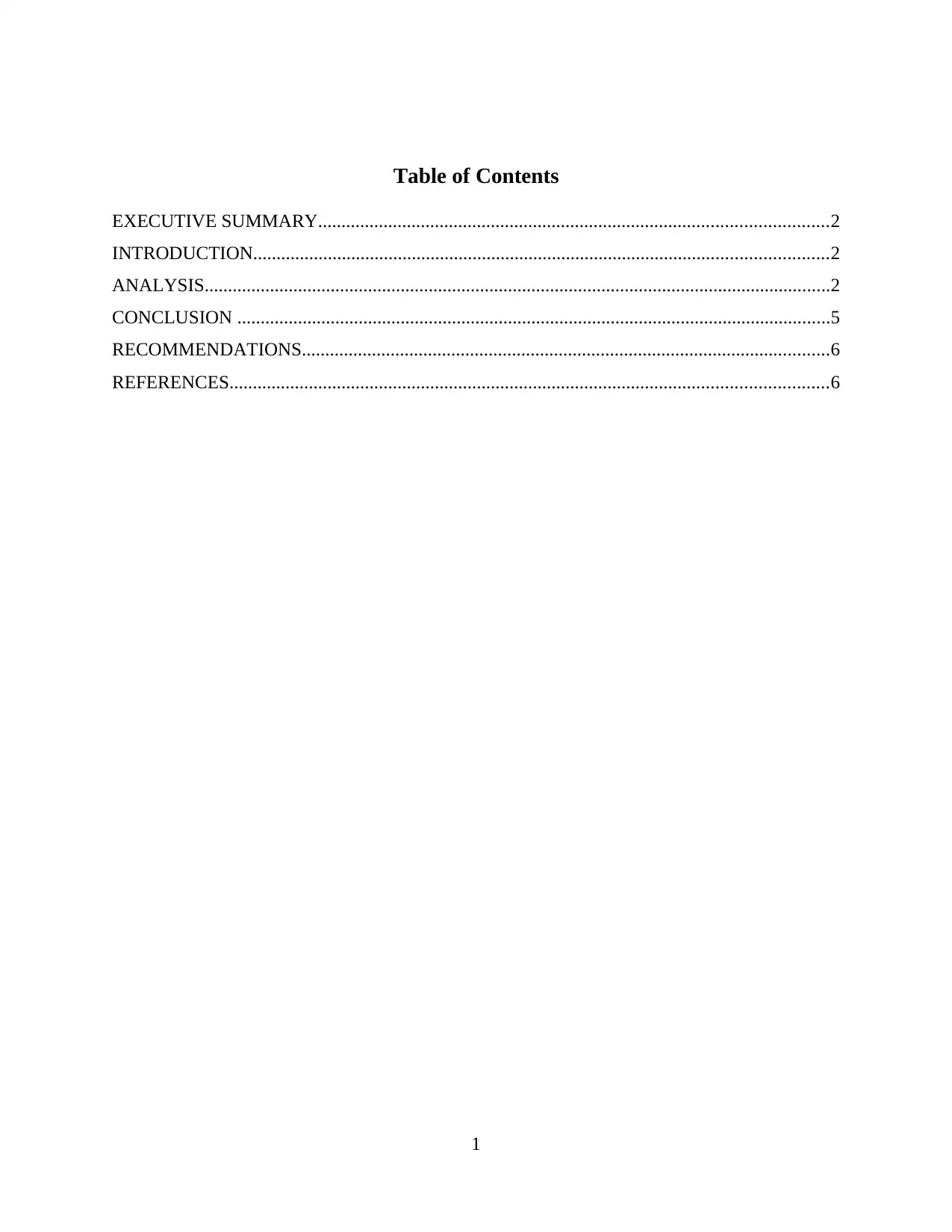
Table of Contents
EXECUTIVE SUMMARY.............................................................................................................2
INTRODUCTION...........................................................................................................................2
ANALYSIS......................................................................................................................................2
CONCLUSION ...............................................................................................................................5
RECOMMENDATIONS.................................................................................................................6
REFERENCES................................................................................................................................6
1
EXECUTIVE SUMMARY.............................................................................................................2
INTRODUCTION...........................................................................................................................2
ANALYSIS......................................................................................................................................2
CONCLUSION ...............................................................................................................................5
RECOMMENDATIONS.................................................................................................................6
REFERENCES................................................................................................................................6
1
⊘ This is a preview!⊘
Do you want full access?
Subscribe today to unlock all pages.

Trusted by 1+ million students worldwide
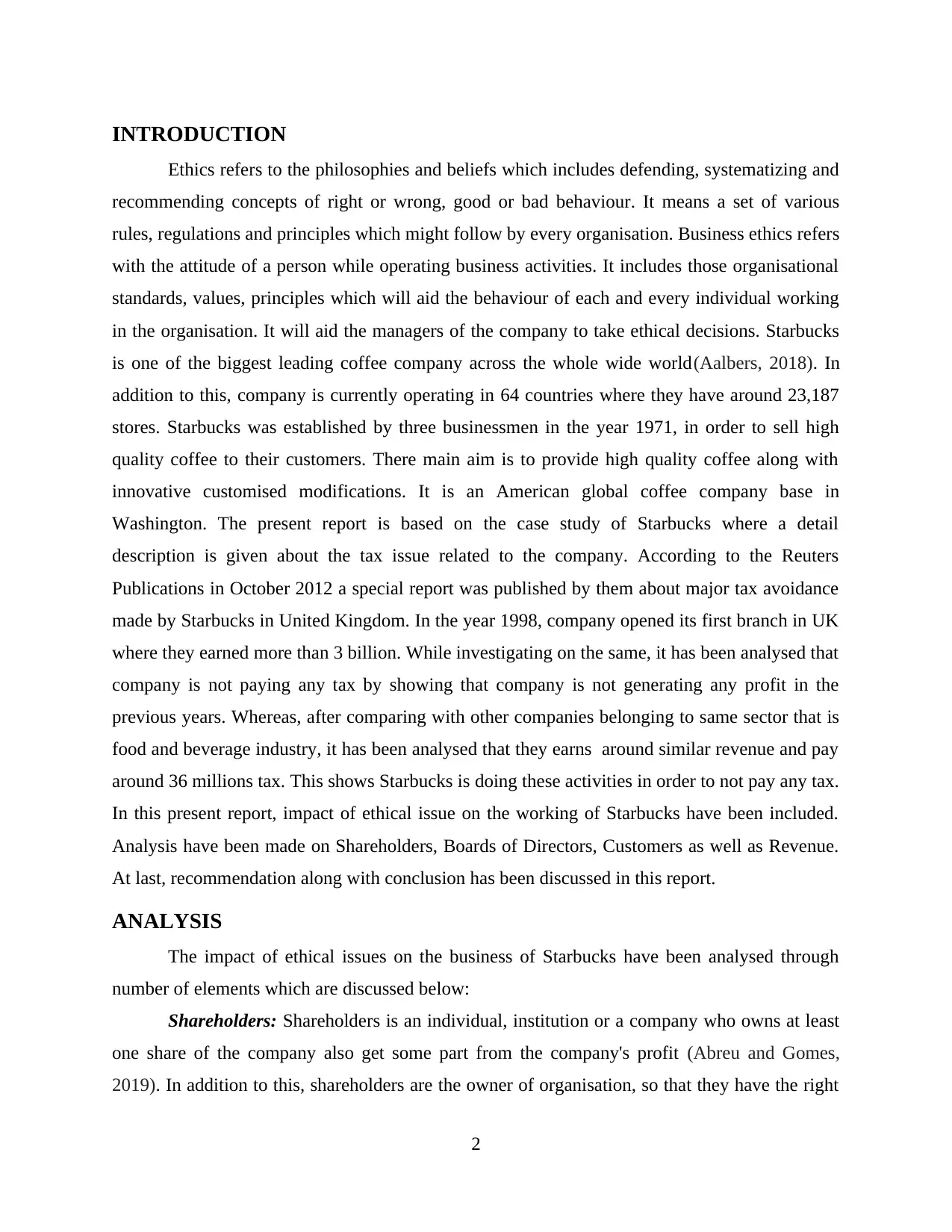
INTRODUCTION
Ethics refers to the philosophies and beliefs which includes defending, systematizing and
recommending concepts of right or wrong, good or bad behaviour. It means a set of various
rules, regulations and principles which might follow by every organisation. Business ethics refers
with the attitude of a person while operating business activities. It includes those organisational
standards, values, principles which will aid the behaviour of each and every individual working
in the organisation. It will aid the managers of the company to take ethical decisions. Starbucks
is one of the biggest leading coffee company across the whole wide world(Aalbers, 2018). In
addition to this, company is currently operating in 64 countries where they have around 23,187
stores. Starbucks was established by three businessmen in the year 1971, in order to sell high
quality coffee to their customers. There main aim is to provide high quality coffee along with
innovative customised modifications. It is an American global coffee company base in
Washington. The present report is based on the case study of Starbucks where a detail
description is given about the tax issue related to the company. According to the Reuters
Publications in October 2012 a special report was published by them about major tax avoidance
made by Starbucks in United Kingdom. In the year 1998, company opened its first branch in UK
where they earned more than 3 billion. While investigating on the same, it has been analysed that
company is not paying any tax by showing that company is not generating any profit in the
previous years. Whereas, after comparing with other companies belonging to same sector that is
food and beverage industry, it has been analysed that they earns around similar revenue and pay
around 36 millions tax. This shows Starbucks is doing these activities in order to not pay any tax.
In this present report, impact of ethical issue on the working of Starbucks have been included.
Analysis have been made on Shareholders, Boards of Directors, Customers as well as Revenue.
At last, recommendation along with conclusion has been discussed in this report.
ANALYSIS
The impact of ethical issues on the business of Starbucks have been analysed through
number of elements which are discussed below:
Shareholders: Shareholders is an individual, institution or a company who owns at least
one share of the company also get some part from the company's profit (Abreu and Gomes,
2019). In addition to this, shareholders are the owner of organisation, so that they have the right
2
Ethics refers to the philosophies and beliefs which includes defending, systematizing and
recommending concepts of right or wrong, good or bad behaviour. It means a set of various
rules, regulations and principles which might follow by every organisation. Business ethics refers
with the attitude of a person while operating business activities. It includes those organisational
standards, values, principles which will aid the behaviour of each and every individual working
in the organisation. It will aid the managers of the company to take ethical decisions. Starbucks
is one of the biggest leading coffee company across the whole wide world(Aalbers, 2018). In
addition to this, company is currently operating in 64 countries where they have around 23,187
stores. Starbucks was established by three businessmen in the year 1971, in order to sell high
quality coffee to their customers. There main aim is to provide high quality coffee along with
innovative customised modifications. It is an American global coffee company base in
Washington. The present report is based on the case study of Starbucks where a detail
description is given about the tax issue related to the company. According to the Reuters
Publications in October 2012 a special report was published by them about major tax avoidance
made by Starbucks in United Kingdom. In the year 1998, company opened its first branch in UK
where they earned more than 3 billion. While investigating on the same, it has been analysed that
company is not paying any tax by showing that company is not generating any profit in the
previous years. Whereas, after comparing with other companies belonging to same sector that is
food and beverage industry, it has been analysed that they earns around similar revenue and pay
around 36 millions tax. This shows Starbucks is doing these activities in order to not pay any tax.
In this present report, impact of ethical issue on the working of Starbucks have been included.
Analysis have been made on Shareholders, Boards of Directors, Customers as well as Revenue.
At last, recommendation along with conclusion has been discussed in this report.
ANALYSIS
The impact of ethical issues on the business of Starbucks have been analysed through
number of elements which are discussed below:
Shareholders: Shareholders is an individual, institution or a company who owns at least
one share of the company also get some part from the company's profit (Abreu and Gomes,
2019). In addition to this, shareholders are the owner of organisation, so that they have the right
2
Paraphrase This Document
Need a fresh take? Get an instant paraphrase of this document with our AI Paraphraser
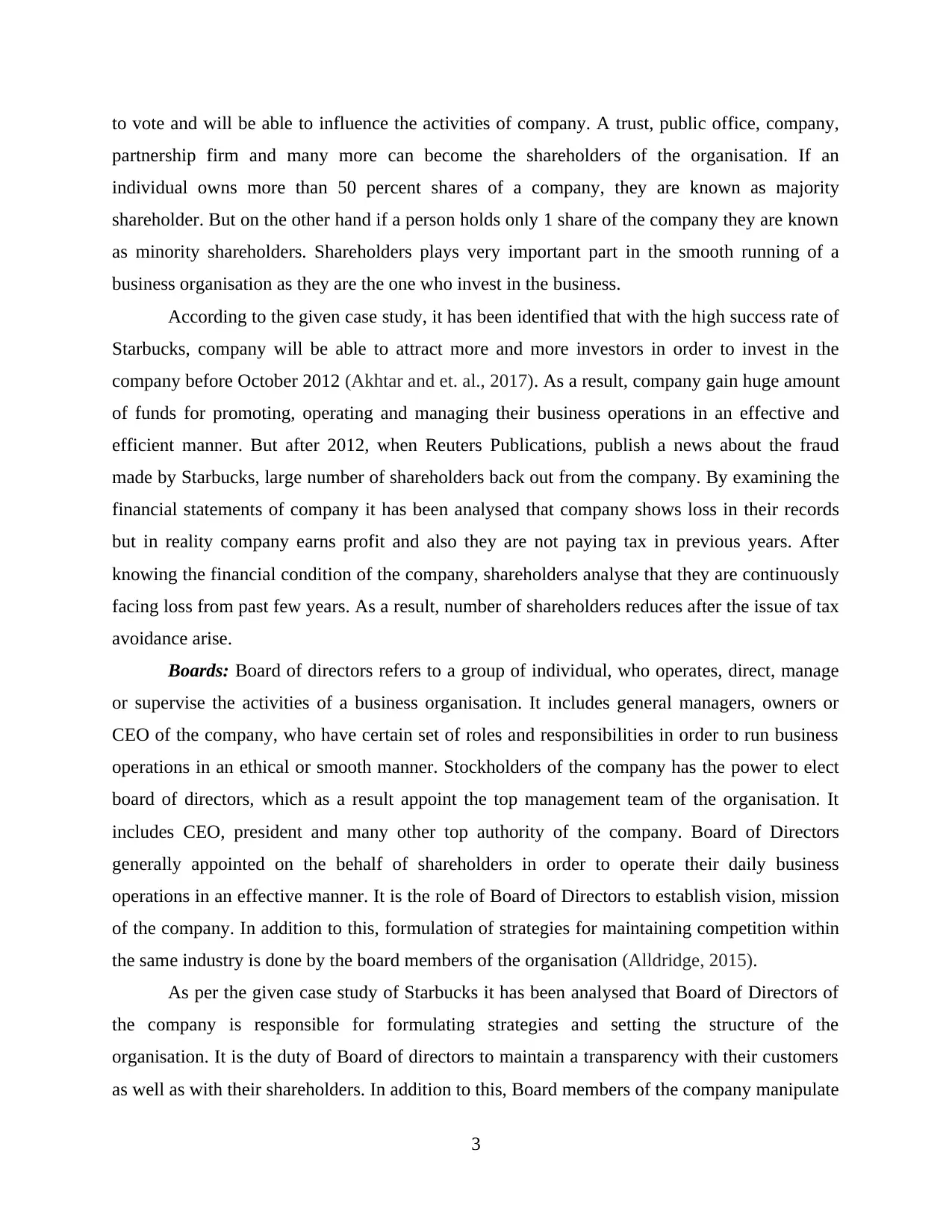
to vote and will be able to influence the activities of company. A trust, public office, company,
partnership firm and many more can become the shareholders of the organisation. If an
individual owns more than 50 percent shares of a company, they are known as majority
shareholder. But on the other hand if a person holds only 1 share of the company they are known
as minority shareholders. Shareholders plays very important part in the smooth running of a
business organisation as they are the one who invest in the business.
According to the given case study, it has been identified that with the high success rate of
Starbucks, company will be able to attract more and more investors in order to invest in the
company before October 2012 (Akhtar and et. al., 2017). As a result, company gain huge amount
of funds for promoting, operating and managing their business operations in an effective and
efficient manner. But after 2012, when Reuters Publications, publish a news about the fraud
made by Starbucks, large number of shareholders back out from the company. By examining the
financial statements of company it has been analysed that company shows loss in their records
but in reality company earns profit and also they are not paying tax in previous years. After
knowing the financial condition of the company, shareholders analyse that they are continuously
facing loss from past few years. As a result, number of shareholders reduces after the issue of tax
avoidance arise.
Boards: Board of directors refers to a group of individual, who operates, direct, manage
or supervise the activities of a business organisation. It includes general managers, owners or
CEO of the company, who have certain set of roles and responsibilities in order to run business
operations in an ethical or smooth manner. Stockholders of the company has the power to elect
board of directors, which as a result appoint the top management team of the organisation. It
includes CEO, president and many other top authority of the company. Board of Directors
generally appointed on the behalf of shareholders in order to operate their daily business
operations in an effective manner. It is the role of Board of Directors to establish vision, mission
of the company. In addition to this, formulation of strategies for maintaining competition within
the same industry is done by the board members of the organisation (Alldridge, 2015).
As per the given case study of Starbucks it has been analysed that Board of Directors of
the company is responsible for formulating strategies and setting the structure of the
organisation. It is the duty of Board of directors to maintain a transparency with their customers
as well as with their shareholders. In addition to this, Board members of the company manipulate
3
partnership firm and many more can become the shareholders of the organisation. If an
individual owns more than 50 percent shares of a company, they are known as majority
shareholder. But on the other hand if a person holds only 1 share of the company they are known
as minority shareholders. Shareholders plays very important part in the smooth running of a
business organisation as they are the one who invest in the business.
According to the given case study, it has been identified that with the high success rate of
Starbucks, company will be able to attract more and more investors in order to invest in the
company before October 2012 (Akhtar and et. al., 2017). As a result, company gain huge amount
of funds for promoting, operating and managing their business operations in an effective and
efficient manner. But after 2012, when Reuters Publications, publish a news about the fraud
made by Starbucks, large number of shareholders back out from the company. By examining the
financial statements of company it has been analysed that company shows loss in their records
but in reality company earns profit and also they are not paying tax in previous years. After
knowing the financial condition of the company, shareholders analyse that they are continuously
facing loss from past few years. As a result, number of shareholders reduces after the issue of tax
avoidance arise.
Boards: Board of directors refers to a group of individual, who operates, direct, manage
or supervise the activities of a business organisation. It includes general managers, owners or
CEO of the company, who have certain set of roles and responsibilities in order to run business
operations in an ethical or smooth manner. Stockholders of the company has the power to elect
board of directors, which as a result appoint the top management team of the organisation. It
includes CEO, president and many other top authority of the company. Board of Directors
generally appointed on the behalf of shareholders in order to operate their daily business
operations in an effective manner. It is the role of Board of Directors to establish vision, mission
of the company. In addition to this, formulation of strategies for maintaining competition within
the same industry is done by the board members of the organisation (Alldridge, 2015).
As per the given case study of Starbucks it has been analysed that Board of Directors of
the company is responsible for formulating strategies and setting the structure of the
organisation. It is the duty of Board of directors to maintain a transparency with their customers
as well as with their shareholders. In addition to this, Board members of the company manipulate
3
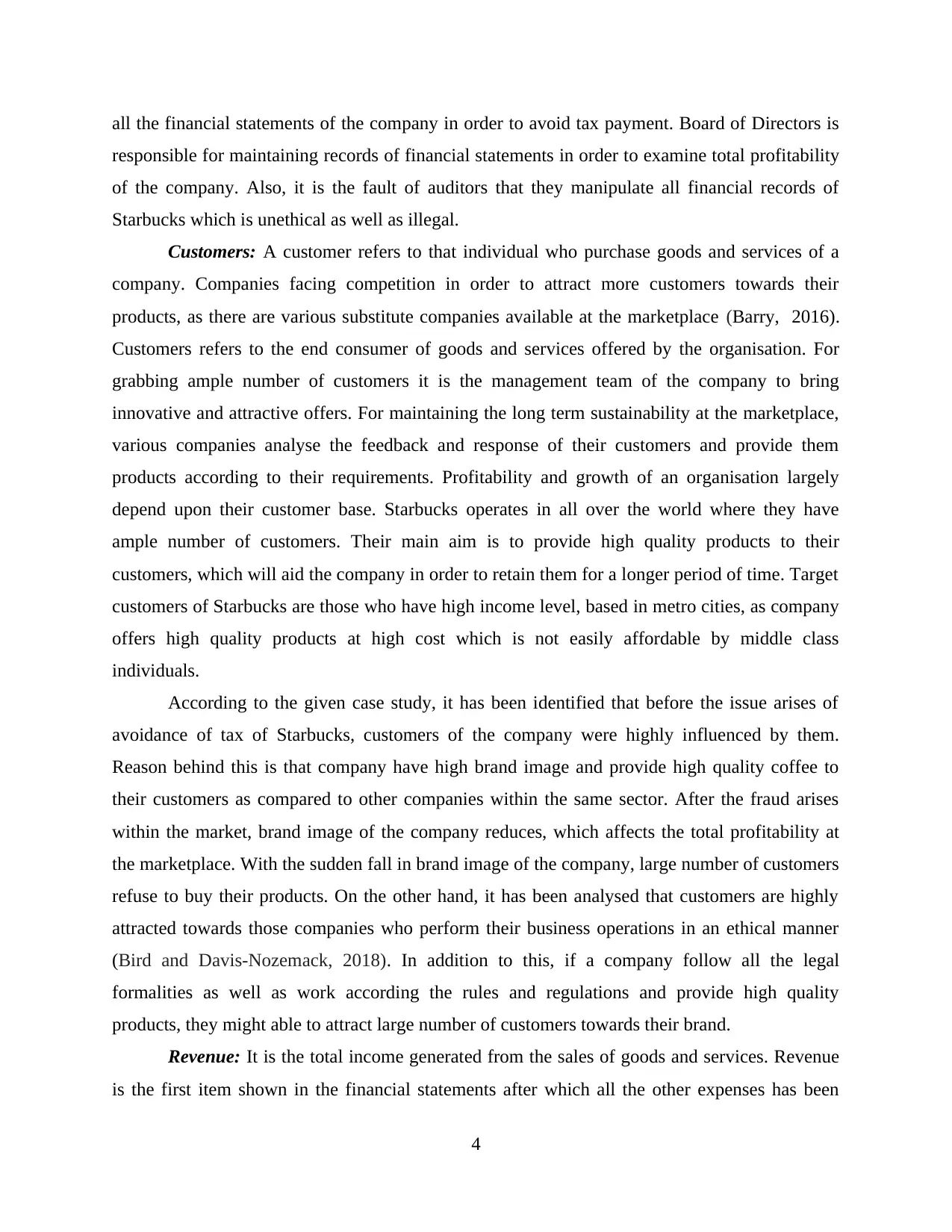
all the financial statements of the company in order to avoid tax payment. Board of Directors is
responsible for maintaining records of financial statements in order to examine total profitability
of the company. Also, it is the fault of auditors that they manipulate all financial records of
Starbucks which is unethical as well as illegal.
Customers: A customer refers to that individual who purchase goods and services of a
company. Companies facing competition in order to attract more customers towards their
products, as there are various substitute companies available at the marketplace (Barry, 2016).
Customers refers to the end consumer of goods and services offered by the organisation. For
grabbing ample number of customers it is the management team of the company to bring
innovative and attractive offers. For maintaining the long term sustainability at the marketplace,
various companies analyse the feedback and response of their customers and provide them
products according to their requirements. Profitability and growth of an organisation largely
depend upon their customer base. Starbucks operates in all over the world where they have
ample number of customers. Their main aim is to provide high quality products to their
customers, which will aid the company in order to retain them for a longer period of time. Target
customers of Starbucks are those who have high income level, based in metro cities, as company
offers high quality products at high cost which is not easily affordable by middle class
individuals.
According to the given case study, it has been identified that before the issue arises of
avoidance of tax of Starbucks, customers of the company were highly influenced by them.
Reason behind this is that company have high brand image and provide high quality coffee to
their customers as compared to other companies within the same sector. After the fraud arises
within the market, brand image of the company reduces, which affects the total profitability at
the marketplace. With the sudden fall in brand image of the company, large number of customers
refuse to buy their products. On the other hand, it has been analysed that customers are highly
attracted towards those companies who perform their business operations in an ethical manner
(Bird and Davis-Nozemack, 2018). In addition to this, if a company follow all the legal
formalities as well as work according the rules and regulations and provide high quality
products, they might able to attract large number of customers towards their brand.
Revenue: It is the total income generated from the sales of goods and services. Revenue
is the first item shown in the financial statements after which all the other expenses has been
4
responsible for maintaining records of financial statements in order to examine total profitability
of the company. Also, it is the fault of auditors that they manipulate all financial records of
Starbucks which is unethical as well as illegal.
Customers: A customer refers to that individual who purchase goods and services of a
company. Companies facing competition in order to attract more customers towards their
products, as there are various substitute companies available at the marketplace (Barry, 2016).
Customers refers to the end consumer of goods and services offered by the organisation. For
grabbing ample number of customers it is the management team of the company to bring
innovative and attractive offers. For maintaining the long term sustainability at the marketplace,
various companies analyse the feedback and response of their customers and provide them
products according to their requirements. Profitability and growth of an organisation largely
depend upon their customer base. Starbucks operates in all over the world where they have
ample number of customers. Their main aim is to provide high quality products to their
customers, which will aid the company in order to retain them for a longer period of time. Target
customers of Starbucks are those who have high income level, based in metro cities, as company
offers high quality products at high cost which is not easily affordable by middle class
individuals.
According to the given case study, it has been identified that before the issue arises of
avoidance of tax of Starbucks, customers of the company were highly influenced by them.
Reason behind this is that company have high brand image and provide high quality coffee to
their customers as compared to other companies within the same sector. After the fraud arises
within the market, brand image of the company reduces, which affects the total profitability at
the marketplace. With the sudden fall in brand image of the company, large number of customers
refuse to buy their products. On the other hand, it has been analysed that customers are highly
attracted towards those companies who perform their business operations in an ethical manner
(Bird and Davis-Nozemack, 2018). In addition to this, if a company follow all the legal
formalities as well as work according the rules and regulations and provide high quality
products, they might able to attract large number of customers towards their brand.
Revenue: It is the total income generated from the sales of goods and services. Revenue
is the first item shown in the financial statements after which all the other expenses has been
4
⊘ This is a preview!⊘
Do you want full access?
Subscribe today to unlock all pages.

Trusted by 1+ million students worldwide
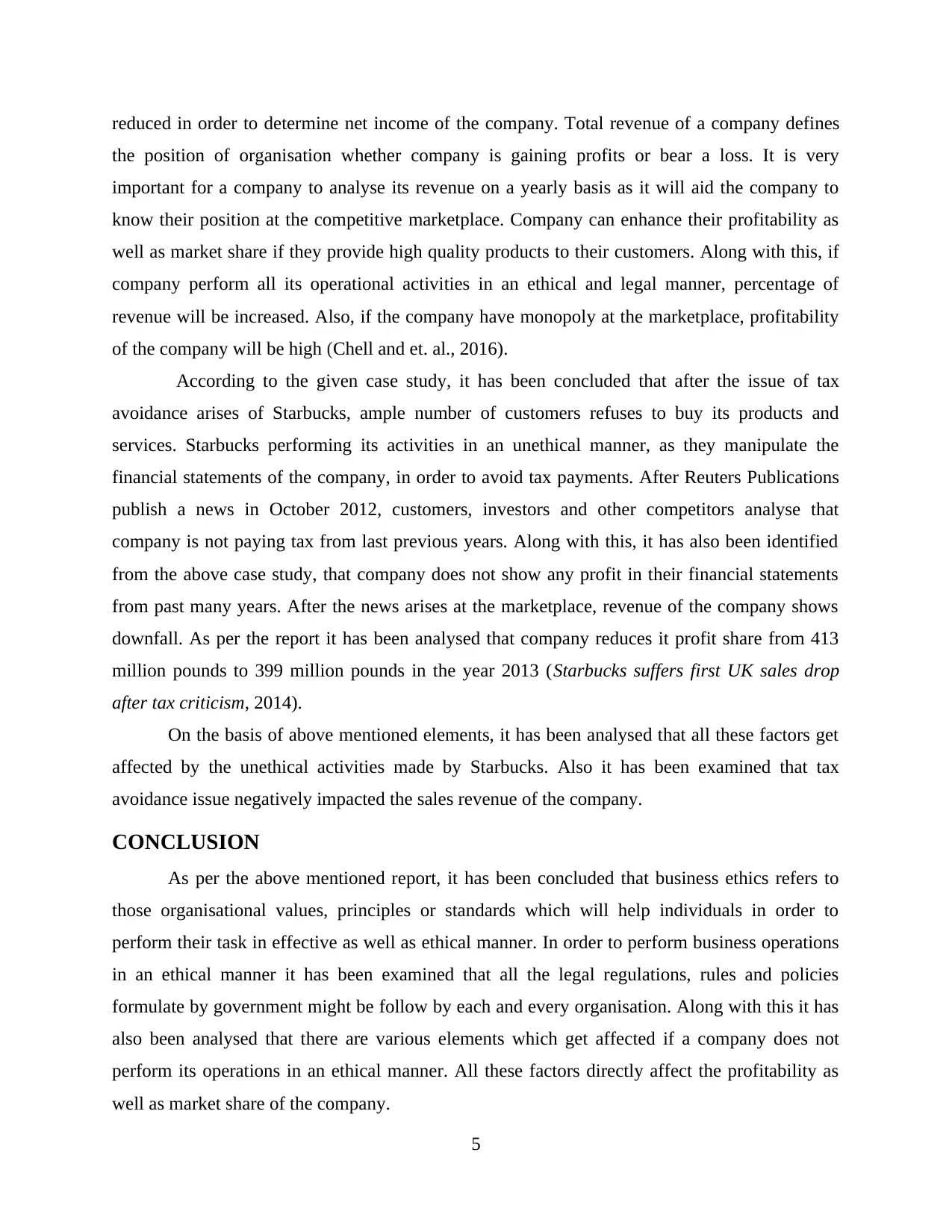
reduced in order to determine net income of the company. Total revenue of a company defines
the position of organisation whether company is gaining profits or bear a loss. It is very
important for a company to analyse its revenue on a yearly basis as it will aid the company to
know their position at the competitive marketplace. Company can enhance their profitability as
well as market share if they provide high quality products to their customers. Along with this, if
company perform all its operational activities in an ethical and legal manner, percentage of
revenue will be increased. Also, if the company have monopoly at the marketplace, profitability
of the company will be high (Chell and et. al., 2016).
According to the given case study, it has been concluded that after the issue of tax
avoidance arises of Starbucks, ample number of customers refuses to buy its products and
services. Starbucks performing its activities in an unethical manner, as they manipulate the
financial statements of the company, in order to avoid tax payments. After Reuters Publications
publish a news in October 2012, customers, investors and other competitors analyse that
company is not paying tax from last previous years. Along with this, it has also been identified
from the above case study, that company does not show any profit in their financial statements
from past many years. After the news arises at the marketplace, revenue of the company shows
downfall. As per the report it has been analysed that company reduces it profit share from 413
million pounds to 399 million pounds in the year 2013 (Starbucks suffers first UK sales drop
after tax criticism, 2014).
On the basis of above mentioned elements, it has been analysed that all these factors get
affected by the unethical activities made by Starbucks. Also it has been examined that tax
avoidance issue negatively impacted the sales revenue of the company.
CONCLUSION
As per the above mentioned report, it has been concluded that business ethics refers to
those organisational values, principles or standards which will help individuals in order to
perform their task in effective as well as ethical manner. In order to perform business operations
in an ethical manner it has been examined that all the legal regulations, rules and policies
formulate by government might be follow by each and every organisation. Along with this it has
also been analysed that there are various elements which get affected if a company does not
perform its operations in an ethical manner. All these factors directly affect the profitability as
well as market share of the company.
5
the position of organisation whether company is gaining profits or bear a loss. It is very
important for a company to analyse its revenue on a yearly basis as it will aid the company to
know their position at the competitive marketplace. Company can enhance their profitability as
well as market share if they provide high quality products to their customers. Along with this, if
company perform all its operational activities in an ethical and legal manner, percentage of
revenue will be increased. Also, if the company have monopoly at the marketplace, profitability
of the company will be high (Chell and et. al., 2016).
According to the given case study, it has been concluded that after the issue of tax
avoidance arises of Starbucks, ample number of customers refuses to buy its products and
services. Starbucks performing its activities in an unethical manner, as they manipulate the
financial statements of the company, in order to avoid tax payments. After Reuters Publications
publish a news in October 2012, customers, investors and other competitors analyse that
company is not paying tax from last previous years. Along with this, it has also been identified
from the above case study, that company does not show any profit in their financial statements
from past many years. After the news arises at the marketplace, revenue of the company shows
downfall. As per the report it has been analysed that company reduces it profit share from 413
million pounds to 399 million pounds in the year 2013 (Starbucks suffers first UK sales drop
after tax criticism, 2014).
On the basis of above mentioned elements, it has been analysed that all these factors get
affected by the unethical activities made by Starbucks. Also it has been examined that tax
avoidance issue negatively impacted the sales revenue of the company.
CONCLUSION
As per the above mentioned report, it has been concluded that business ethics refers to
those organisational values, principles or standards which will help individuals in order to
perform their task in effective as well as ethical manner. In order to perform business operations
in an ethical manner it has been examined that all the legal regulations, rules and policies
formulate by government might be follow by each and every organisation. Along with this it has
also been analysed that there are various elements which get affected if a company does not
perform its operations in an ethical manner. All these factors directly affect the profitability as
well as market share of the company.
5
Paraphrase This Document
Need a fresh take? Get an instant paraphrase of this document with our AI Paraphraser
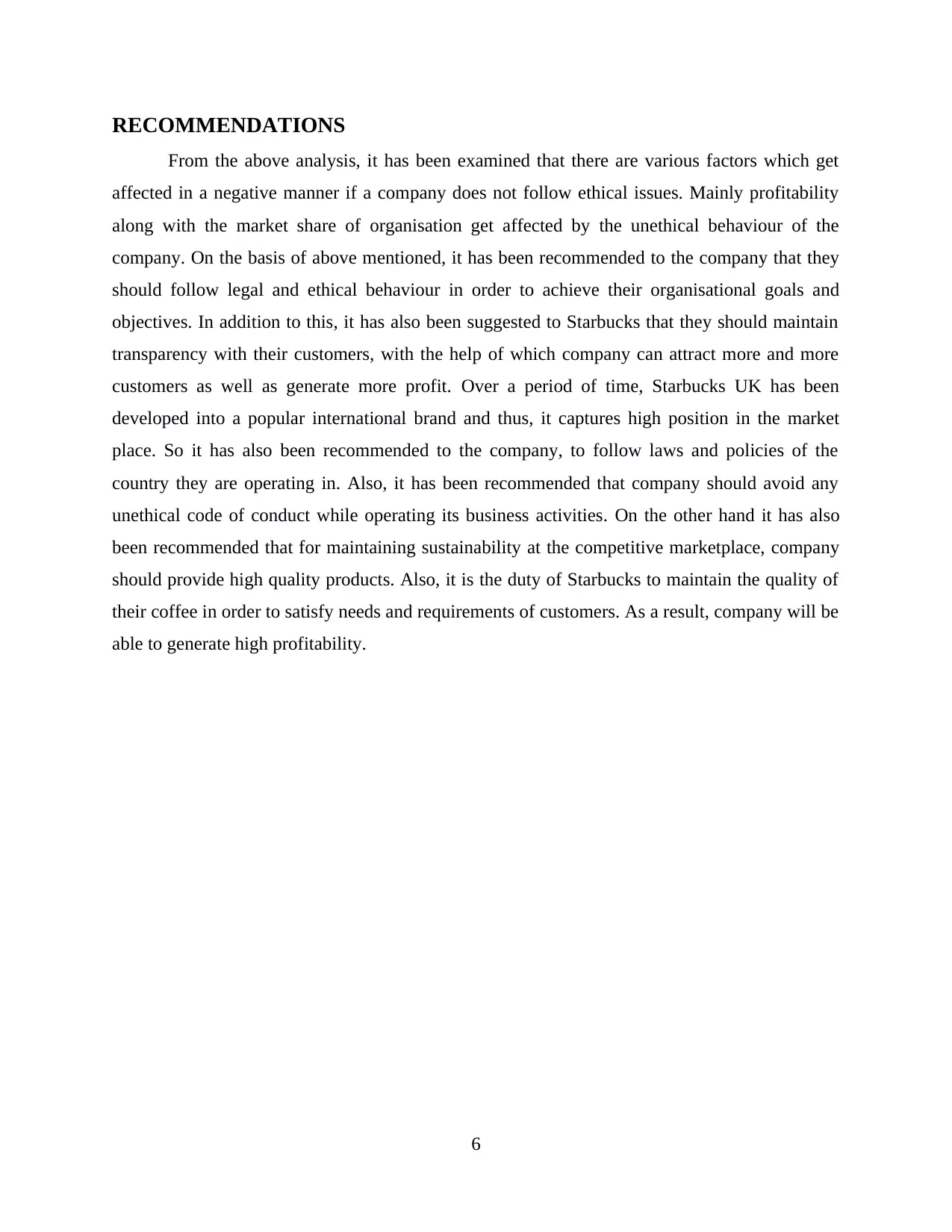
RECOMMENDATIONS
From the above analysis, it has been examined that there are various factors which get
affected in a negative manner if a company does not follow ethical issues. Mainly profitability
along with the market share of organisation get affected by the unethical behaviour of the
company. On the basis of above mentioned, it has been recommended to the company that they
should follow legal and ethical behaviour in order to achieve their organisational goals and
objectives. In addition to this, it has also been suggested to Starbucks that they should maintain
transparency with their customers, with the help of which company can attract more and more
customers as well as generate more profit. Over a period of time, Starbucks UK has been
developed into a popular international brand and thus, it captures high position in the market
place. So it has also been recommended to the company, to follow laws and policies of the
country they are operating in. Also, it has been recommended that company should avoid any
unethical code of conduct while operating its business activities. On the other hand it has also
been recommended that for maintaining sustainability at the competitive marketplace, company
should provide high quality products. Also, it is the duty of Starbucks to maintain the quality of
their coffee in order to satisfy needs and requirements of customers. As a result, company will be
able to generate high profitability.
6
From the above analysis, it has been examined that there are various factors which get
affected in a negative manner if a company does not follow ethical issues. Mainly profitability
along with the market share of organisation get affected by the unethical behaviour of the
company. On the basis of above mentioned, it has been recommended to the company that they
should follow legal and ethical behaviour in order to achieve their organisational goals and
objectives. In addition to this, it has also been suggested to Starbucks that they should maintain
transparency with their customers, with the help of which company can attract more and more
customers as well as generate more profit. Over a period of time, Starbucks UK has been
developed into a popular international brand and thus, it captures high position in the market
place. So it has also been recommended to the company, to follow laws and policies of the
country they are operating in. Also, it has been recommended that company should avoid any
unethical code of conduct while operating its business activities. On the other hand it has also
been recommended that for maintaining sustainability at the competitive marketplace, company
should provide high quality products. Also, it is the duty of Starbucks to maintain the quality of
their coffee in order to satisfy needs and requirements of customers. As a result, company will be
able to generate high profitability.
6
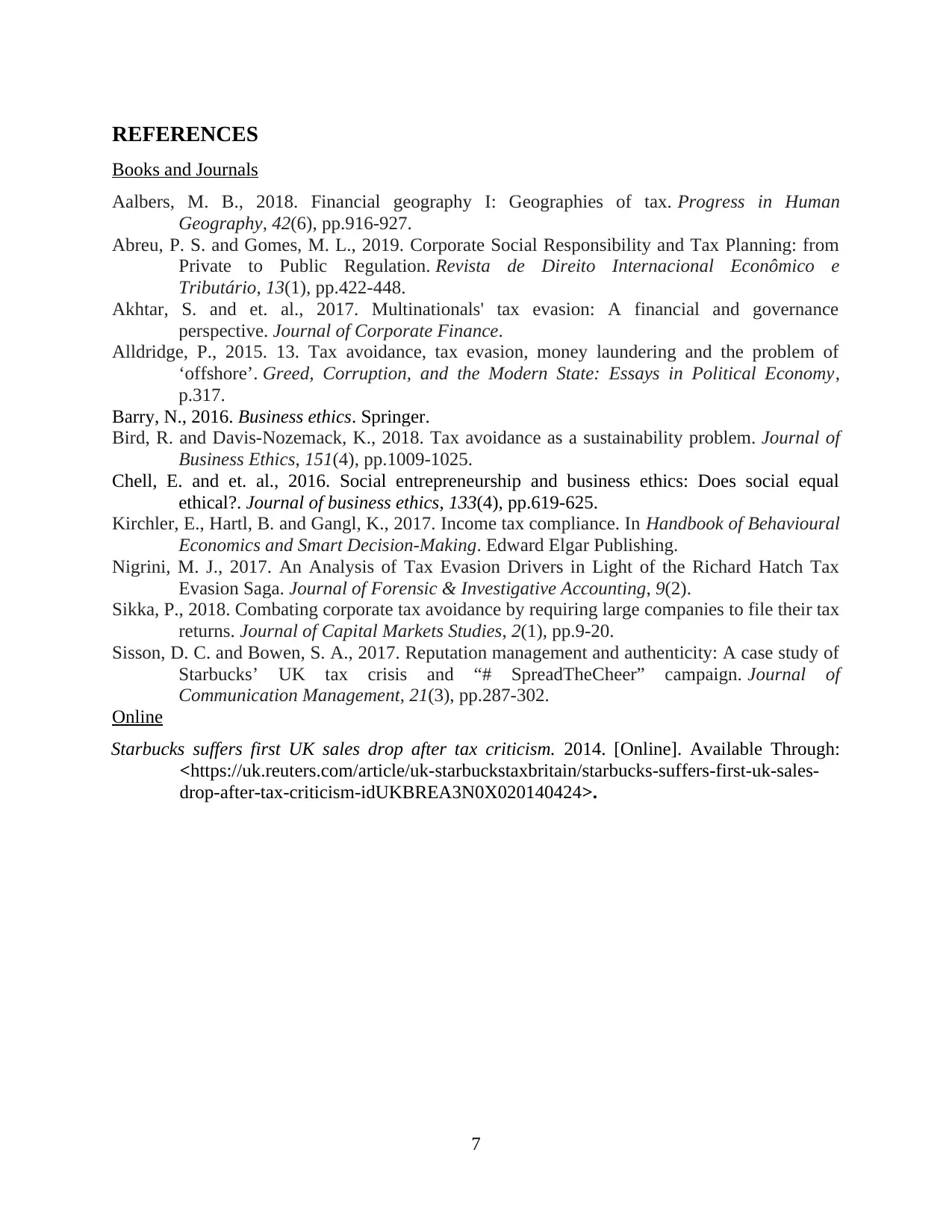
REFERENCES
Books and Journals
Aalbers, M. B., 2018. Financial geography I: Geographies of tax. Progress in Human
Geography, 42(6), pp.916-927.
Abreu, P. S. and Gomes, M. L., 2019. Corporate Social Responsibility and Tax Planning: from
Private to Public Regulation. Revista de Direito Internacional Econômico e
Tributário, 13(1), pp.422-448.
Akhtar, S. and et. al., 2017. Multinationals' tax evasion: A financial and governance
perspective. Journal of Corporate Finance.
Alldridge, P., 2015. 13. Tax avoidance, tax evasion, money laundering and the problem of
‘offshore’. Greed, Corruption, and the Modern State: Essays in Political Economy,
p.317.
Barry, N., 2016. Business ethics. Springer.
Bird, R. and Davis-Nozemack, K., 2018. Tax avoidance as a sustainability problem. Journal of
Business Ethics, 151(4), pp.1009-1025.
Chell, E. and et. al., 2016. Social entrepreneurship and business ethics: Does social equal
ethical?. Journal of business ethics, 133(4), pp.619-625.
Kirchler, E., Hartl, B. and Gangl, K., 2017. Income tax compliance. In Handbook of Behavioural
Economics and Smart Decision-Making. Edward Elgar Publishing.
Nigrini, M. J., 2017. An Analysis of Tax Evasion Drivers in Light of the Richard Hatch Tax
Evasion Saga. Journal of Forensic & Investigative Accounting, 9(2).
Sikka, P., 2018. Combating corporate tax avoidance by requiring large companies to file their tax
returns. Journal of Capital Markets Studies, 2(1), pp.9-20.
Sisson, D. C. and Bowen, S. A., 2017. Reputation management and authenticity: A case study of
Starbucks’ UK tax crisis and “# SpreadTheCheer” campaign. Journal of
Communication Management, 21(3), pp.287-302.
Online
Starbucks suffers first UK sales drop after tax criticism. 2014. [Online]. Available Through:
<https://uk.reuters.com/article/uk-starbuckstaxbritain/starbucks-suffers-first-uk-sales-
drop-after-tax-criticism-idUKBREA3N0X020140424>.
7
Books and Journals
Aalbers, M. B., 2018. Financial geography I: Geographies of tax. Progress in Human
Geography, 42(6), pp.916-927.
Abreu, P. S. and Gomes, M. L., 2019. Corporate Social Responsibility and Tax Planning: from
Private to Public Regulation. Revista de Direito Internacional Econômico e
Tributário, 13(1), pp.422-448.
Akhtar, S. and et. al., 2017. Multinationals' tax evasion: A financial and governance
perspective. Journal of Corporate Finance.
Alldridge, P., 2015. 13. Tax avoidance, tax evasion, money laundering and the problem of
‘offshore’. Greed, Corruption, and the Modern State: Essays in Political Economy,
p.317.
Barry, N., 2016. Business ethics. Springer.
Bird, R. and Davis-Nozemack, K., 2018. Tax avoidance as a sustainability problem. Journal of
Business Ethics, 151(4), pp.1009-1025.
Chell, E. and et. al., 2016. Social entrepreneurship and business ethics: Does social equal
ethical?. Journal of business ethics, 133(4), pp.619-625.
Kirchler, E., Hartl, B. and Gangl, K., 2017. Income tax compliance. In Handbook of Behavioural
Economics and Smart Decision-Making. Edward Elgar Publishing.
Nigrini, M. J., 2017. An Analysis of Tax Evasion Drivers in Light of the Richard Hatch Tax
Evasion Saga. Journal of Forensic & Investigative Accounting, 9(2).
Sikka, P., 2018. Combating corporate tax avoidance by requiring large companies to file their tax
returns. Journal of Capital Markets Studies, 2(1), pp.9-20.
Sisson, D. C. and Bowen, S. A., 2017. Reputation management and authenticity: A case study of
Starbucks’ UK tax crisis and “# SpreadTheCheer” campaign. Journal of
Communication Management, 21(3), pp.287-302.
Online
Starbucks suffers first UK sales drop after tax criticism. 2014. [Online]. Available Through:
<https://uk.reuters.com/article/uk-starbuckstaxbritain/starbucks-suffers-first-uk-sales-
drop-after-tax-criticism-idUKBREA3N0X020140424>.
7
⊘ This is a preview!⊘
Do you want full access?
Subscribe today to unlock all pages.

Trusted by 1+ million students worldwide
1 out of 9
Related Documents
Your All-in-One AI-Powered Toolkit for Academic Success.
+13062052269
info@desklib.com
Available 24*7 on WhatsApp / Email
![[object Object]](/_next/static/media/star-bottom.7253800d.svg)
Unlock your academic potential
Copyright © 2020–2026 A2Z Services. All Rights Reserved. Developed and managed by ZUCOL.




